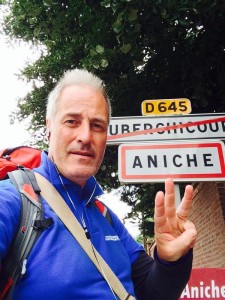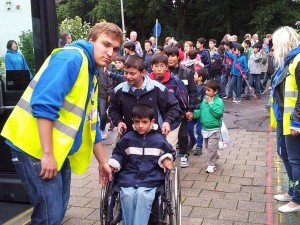One question that is regularly asked when I set myself these challenges is what qualities are needed to tackle such walks?
Now some way into my #walk4peace I’ve certainly had the chance to reflect on the qualities needed and thought I would share some of them with you.
The first, in my opinion, is purpose. For me walking is a mechanism for protest/action. It is a way for those of us who are sensitive to the world around us, but lack the position or power to do anything about it, to feel they can make a small difference. Without a clear purpose, I would lack the focus to apply myself to a task which I find physically draining, but with a clear purpose I feel I could walk around the world.
The next, I would say is adaptability. On any long walk or expedition things are not always going to go to plan. As I’ve experienced on my walk so far, you are not always going to be able to solve every problem and sometimes you will need to take a long detour around it. Any walker will need to be able to keep any problems in perspective and be able to adapt to unexpected situations. If you are the type of person who likes to confirm exact details in advance, walking might not be the right thing for you.
Finally, optimism is vital. As mentioned in my previous posts, I have spent a few interesting evenings whilst away walking, staying in bus shelters and barns to name a few. Of course I don’t enjoy these experiences, but what gets me through is the unshakable belief that in the next town I am going to find a Holiday Inn Express with a 24 hour buffet! The point of my story is that believing in a better tomorrow can enable us to experience a better today.
Following a tough few days, by day 15 I was able to enjoy the fact that the walk was back on track and that if I made it to Doullens by evening then that would be a massive hurdle cleared.
Once I arrived in Doullen I explored the beautiful town before being met by my wife Xuelin who had been driving the support vehicle. Once I arrived in my hotel for the night I removed my shoes to find that my foot was still badly inflamed. Xuelin and I agreed that I would need another day of rest and my struggle to get back on schedule was diminished.
Day 18 was a 17.6 miles walk for me from Arras to Douai, this time without the support of Xuelin in a support vehicle as she needed to head back to London.
By the time I reached Douai it was 6.30pm – normally I would have done another six miles by this hour but it was that kind of day. Douai was a great centre for English Catholic scholars during the period of Catholic persecution in England and was where the first Roman Catholic English translation of the Bible was completed.
Day 19 was a walk from Douai to Valenciennes, which would mean walking 23.4 miles. It was also the day that donations reached an incredible £10,000 and I couldn’t be happier. I am so happy for the support people have shown me and Friedensdorf International. It costs 50 euros a day to keep a child at Friedensdorf and there are 250 children there at any one time, so your donations so far have kept the whole village going for a day. I am so grateful for this support, so thank you to you all.
It is also the day I reached my third ‘100 mile’ marker in Aniche. Such milestones do mean a great deal as they break up such a huge task into manageable pieces. I celebrated by having a coffee in the town square.
I then spent the next two days leaving France and heading into Belgium where I reached Mons on Day 21. This meant that in total I have so far walked 320.80 miles.
Mons was another important stop on my #walk4peace and historical journey as the British Expeditionary Force of 70,000 men arrived in Mons on 22nd August under the command of General Sir John French with instructions to hold the Mons-Conde canal against the advance of the German 1st Army of 160,000 men. They dug in along the canal bank. Then on Sunday morning 23 August a small German cavalry patrol approached the canal and the British opened fire. By the end of that first day there were 1500 British casualties and about 5000 German. The next day, 24 August, unexpectedly the British forces decided to retreat.
 Department for Culture, Media and Sport
Department for Culture, Media and Sport

